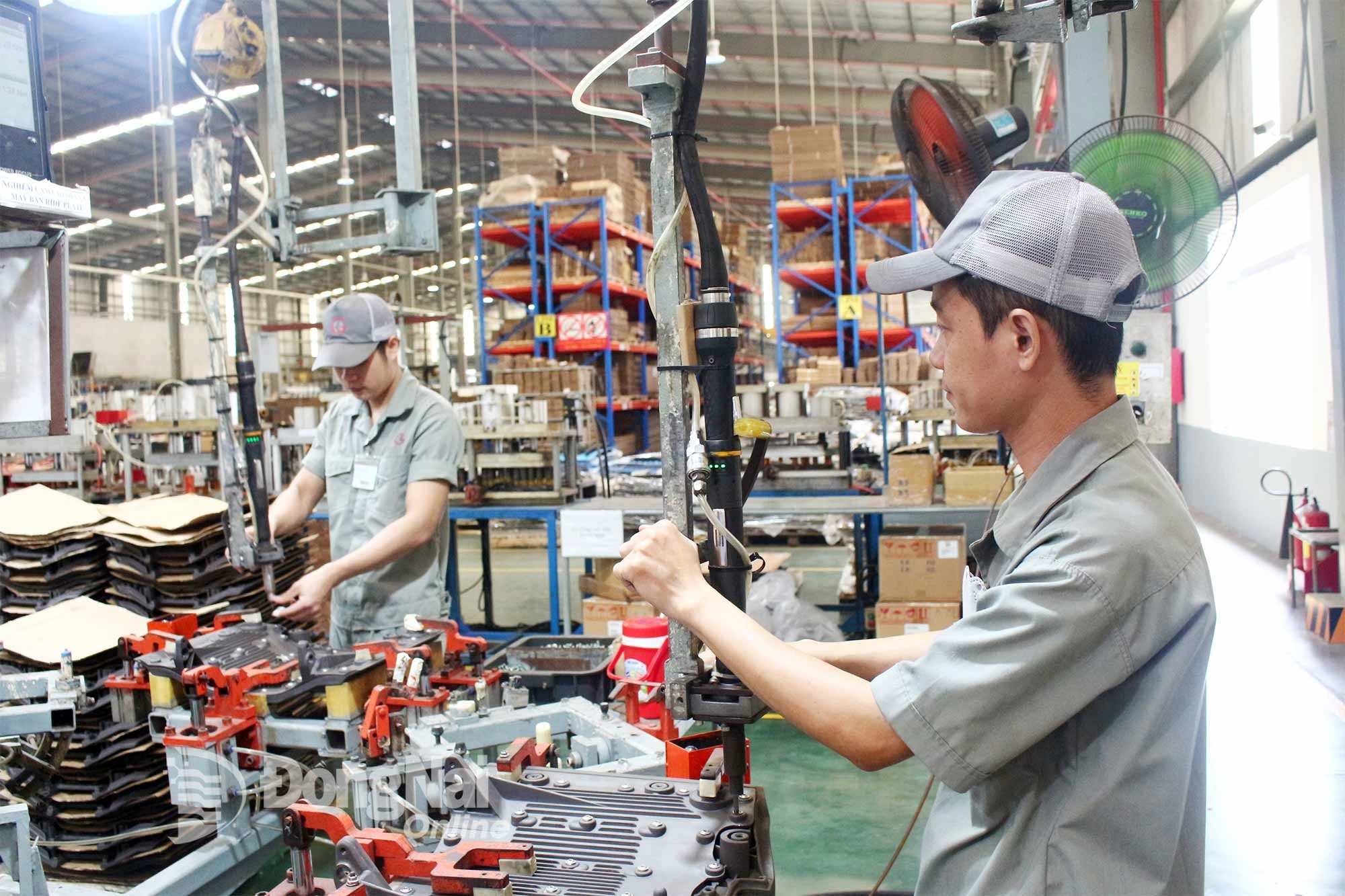 |
| Workers at Global Mechanical Engineering Co., Ltd. (located in Trang Bom commune) during production hours. Photo: N. Hoa |
This was the issue shared by departments, agencies, and businesses at the recent Workshop on Opportunities and Challenges in Training Human Resources for Socio -Economic Development in the Province, organized by the Department of Internal Affairs in coordination with the Department of Education and Training.
Vocational training has not met actual needs.
According to the Department of Internal Affairs, Dong Nai is one of the most dynamically developing localities, playing an important role in the Southern key economic region. The process of attracting investment from domestic and foreign businesses has created a great demand for highly skilled human resources. However, alongside these great opportunities, the province faces many challenges such as: a low percentage of trained workers; a shortage of quality human resources for technology and supporting industries; and a lack of effective connection between schools and businesses.
Currently, businesses in the province are recruiting workers primarily in processing industries, high technology, supporting industries, transportation, logistics, and e-commerce. Regarding quality, there is a high demand for skilled workers, especially those in electronics, electrical, mechanical, precision engineering, and information technology. These workers need to be able to work in a professional environment and quickly adapt to new technologies.
Speaking at the workshop, businesses stated that the percentage of trained workers capable of applying their skills to actual production work remains limited, especially in high-tech fields.
According to Mr. Le Duc Vinh, Human Resources Director of Electronic Tripod Vietnam Co., Ltd. (Bien Hoa 2 Industrial Park, Tran Bien Ward), the reality is that some training programs are not aligned with the requirements of businesses, focusing heavily on theory and lacking practical training. Furthermore, the workforce does not meet the professional needs, work ethic, and discipline requirements. This situation is causing businesses to face a shortage of skilled labor.
Mr. Le Duc Vinh further stated that high-quality labor plays a key role in the current trend, but the training of human resources faces the paradox of both surplus and shortage.
“After the merger, Dong Nai province has seen an increase in the number of industrial parks and businesses, leading to a higher demand for human resources. Therefore, human resource training needs to be multidisciplinary, combining specialized training with specialized foreign language training. Furthermore, schools and businesses need to connect to understand current industry trends and develop open-minded training methods to meet future workforce needs,” Mr. Le Duc Vinh shared.
Ms. Tran Dang Quynh Chau, Deputy Head of Human Resources at Advanced Multitech Vietnam Co., Ltd. (located in Nhon Trach commune), said that the company currently has nearly 4,000 employees. From now until the end of 2025, the company plans to recruit about 1,000 workers for production, including about 100 technical workers who know Chinese. However, the current supply of personnel who know Chinese and have technical expertise is limited. In addition, workers lack soft skills, foreign language skills, and creative thinking. Therefore, it is necessary to innovate and improve the quality of training in professions that meet the actual job requirements.
Human resources are a valuable asset for sustainable business development. Only when human resources are truly considered central can businesses achieve sustainable growth. At the workshop, businesses stated that they will continue to collaborate with local authorities and educational institutions to build an effective and sustainable ecosystem for training and utilizing labor.
There needs to be collaboration between schools and businesses.
At the Workshop on Opportunities and Challenges in Training Human Resources for Socio-Economic Development in the Province, leaders of departments and agencies, along with representatives from businesses and educational institutions, contributed opinions on the future direction of human resource training in the province. They also proposed strategic solutions and effective training models, suggesting ways to connect businesses and vocational education institutions; and strengthening support and close links between training and the utilization of trained human resources.
Nguyen Vu Quynh, Vice Rector of Lac Hong University (located in Tran Bien ward), shared that the university collaborates with over 200 businesses in training programs each year, and currently has over 1,000 businesses involved. These collaborative models include dual training, on-site classes at businesses, and training in microchip engineers, mechatronics engineers, and automation engineers. Effective collaboration between higher education institutions and businesses has become a key solution to improving training quality and meeting the increasingly stringent demands of the labor market.
Mr. Nguyen Vu Quynh proposed the establishment of a provincial-level human resource development council, comprising representatives from the State, educational institutions, and businesses, to build long-term orientations and coordinate human resource development strategies based on tripartite connections. He also suggested researching and developing training models that foster interaction and collaboration between training institutions and businesses, aligning with the high-tech development orientation; and strengthening the mechanism for commissioning training in key sectors.
According to Bui Dinh Ninh, Principal of the Eastern College (Binh Phuoc Ward), the current limitations of vocational education institutions are access to the labor market and connections between schools and businesses. Therefore, following the merger of the former Dong Nai and Binh Phuoc provinces, vocational education institutions hope the province will soon approve a strategy for developing human resource needs and promote job fairs. Based on this, vocational schools will have greater access to information and connections with businesses.
In the context of integration and development, high-quality human resources determine the sustainable development of businesses. The rapid changes in the labor market in the era of Industry 4.0 and the rise of AI require workers to constantly update their knowledge and soft skills to meet the recruitment requirements of businesses. Based on this reality, participants in the workshop argued that it is necessary to strengthen the connection between educational institutions and businesses to train and connect workers, meeting the current labor market demands and resource needs.
Nguyen Hoa
Source: https://baodongnai.com.vn/moi-nong/202507/vi-sao-doanh-nghiep-thieu-lao-dong-chat-luong-cao-0852caf/








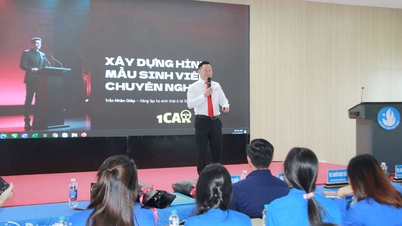





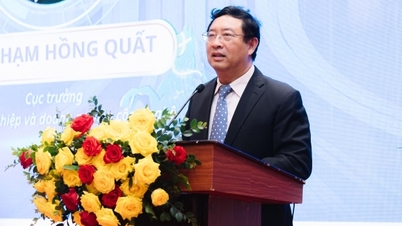

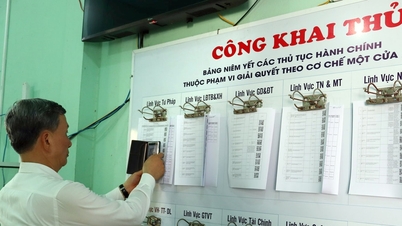















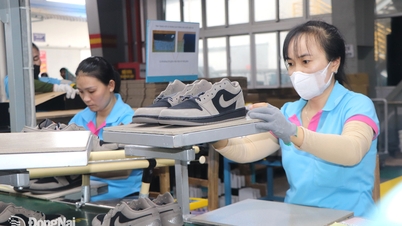


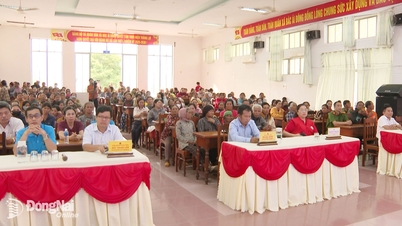
















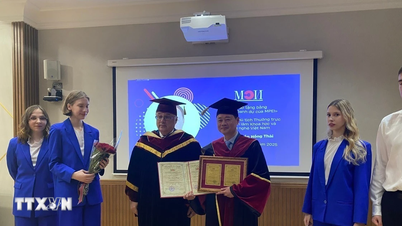

































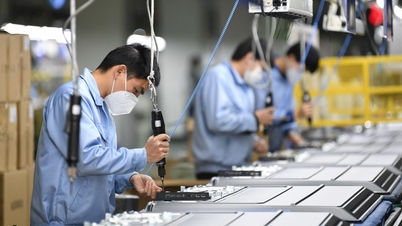























Comment (0)